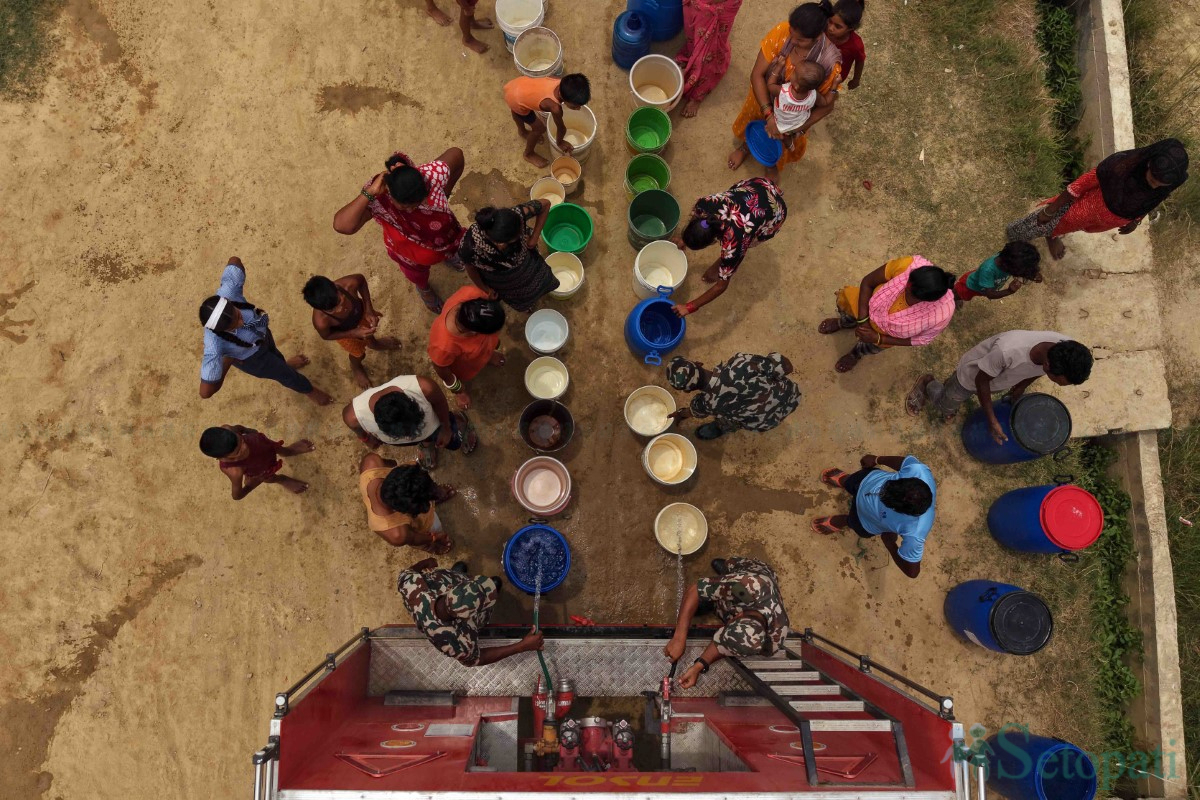A video of an elderly Madheshi woman carefully pouring water from her bottle onto crops rooted in the parched land is circulating widely on social media. Many more such videos and photos are going viral. These lived experiences underscore the gap between global legal frameworks and the real-world suffering experienced on the ground, illustrating the inadequacies of “climate justice” for the Global South.
The International Court of Justice (ICJ) declared climate inaction illegal on July 23, 2025, through its Advisory Opinion, reshaping global accountability. On the same day, the Government of Nepal declared Madhesh province a “disaster crisis zone” after acute water shortages and prolonged drought. This situation highlights the struggle of citizens to obtain what should be their fundamental right. This “water emergency” and “drought” signify the collapse of governance in the “Water Tower of Asia.” The current situation in Nepal exemplifies the “canary in the coal mine” for about 2 billion people relying on Himalayan waters.
With the Himalayan glaciers melting so quickly, Nepal is losing water supplies at an alarming rate. According to a 2023 report published by the International Centre for Integrated Mountain Development (ICIMOD), Himalayan glaciers have vanished at a warped speed, 65 percent faster since 2010. The authors of the report stated that these changes are “unprecedented and largely irreversible.” Furthermore, the misappropriation and embezzlement of millions from water projects like the Melamchi Water Supply Project and Mangalsen Municipality’s public taps in Achham compounds the crisis. As the communities wait indefinitely for clean water from these promised systems, elites freely drill illegal borewells.
The lack of adequate protection for the population in the face of river monetization underscores a governance failure that extends beyond climate change. India and China’s upstream dams, like Pancheshwar and Budhigandaki, violate the UN Watercourses Convention and/or the United Nations Convention on the Law of the Sea (UNCLOS) transboundary harm duties and significantly affect Nepal’s ecosystems and human populations. In Nepal, hydropower exports have often taken precedence over drinking water, and poor planning in urbanization has worsened the disaster. Moreover, the recent unpredictable patterns of monsoons and climate change have destroyed rain-fed agriculture, and villages have been devastated.
The effects of climate change are made worse by added layers of prejudice and exclusion. According to reports from UN agencies and INGOs, Dalit settlements are denied access to public taps, forcing them to drink from polluted rivers and ponds. Women and girls are further pushed to the margins and excluded from education and income because they frequently spend over 4 hours a day collecting water. “Green” projects that are not codesigned and coproduced with Indigenous groups result in their displacement. Given these challenges, it is crucial to consider whether the ICJ Advisory Opinion could serve as a legal tool to support and protect vulnerable communities.
The Court observed that climate change has erga omnes obligations, meaning “by their very nature … the concern of all states.” Although the Court could not specify the legal consequences of breaching obligations to protect the climate system, it highlighted ongoing obligations of performance, cessation, and non-repetition; it also emphasized the obligation to make reparation, which includes restitution, compensation, and/or satisfaction. The breaches of obligations do not undermine “the continued duty of the responsible state to perform the obligation breached.” Climate change has transboundary consequences, and polluters owe compensation for loss and damage. The Court further stated that “environmental protection is a precondition for enjoying human rights,” as set out in the UN Charter and various treaties. Access to clean water is a non-derogable right to life. However, the current water crisis in Nepal violates Nepal’s obligations to international treaties, principles, and customary international law. Nepal fails to apply the standard of due diligence for the prevention of significant environmental harm and to adopt “appropriate rules and measures along with vigilance” to address the concerns of climate change.
Additionally, the Court stated that a state’s failure to protect the climate system from greenhouse gas emissions constitutes a “wrongful act.” This is further emphasized by the surge in global subsidies for fossil fuel consumption, which in 2022 exceeded USD 1 trillion due to energy security concerns and consumer price protections. Post-tax subsidies reached USD 7 trillion, marking a 12-15 percent real-term increase from 2020, highlighting the ongoing financial support for fossil fuels. G20 nations account for 80 percent of this increase. Despite the significant contributions of G20 nations to global emissions, the distribution of climate finance remains uneven, with Nepal receiving a minimal portion. As of 2023, Nepal's annual share of global CO2 emissions was 0.04 percent, while its contribution to global cumulative CO2 emissions from 1750 to 2023 was 0.01 percent. Given its minimal contributions to global emissions, Nepal bears a disproportionately high climate vulnerability due to its geographical location in the Himalayas and its economic reliance on climate-sensitive sectors. The ICJ highlighted the importance of climate justice and raised concerns over the “wrongful acts” of states, yet it remains uncertain how these concerns will translate into actionable support for vulnerable countries like Nepal.
Nepal’s civil society can initiate legal actions, such as filing lawsuits or advocating for policy changes, focused on achieving climate justice. Youths, communities, and NGOs from Nepal could file the first ICJ-based lawsuit against state inertia. A collaborative effort to revive ancient “dhunge dharas” and implement community-led rainwater harvesting could bring hope to the Nepali people. The government should take decisive actions, including bans on water-intensive luxury crops and golf courses, and focus on negotiating with India and China to address the Himalayan ecological debt through water-sharing agreements.
In Nepal, justice requires the collective efforts of its people, such as community-led initiatives and legal actions, to address climate challenges.
(The author is a human rights professional from Madhesh, Nepal, currently pursuing a Master of Human Rights Law at the University of Melbourne as an Australia Awards Scholar.)

